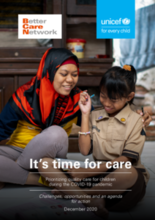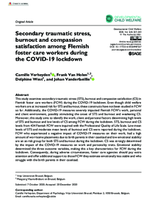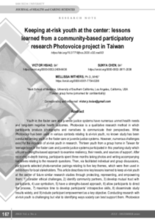Demographic Data
|
Sources: World Bank, UNDP, UNAIDS, DHS 2013 |
Displaying 3081 - 3090 of 14390
This article describes the benefits of monthly family team meetings for parents involved with child welfare. Findings are shared from semi‐structured, qualitative interviews conducted with 17 parents whose children had been placed in substitute care.
This new discussion paper produced by UNICEF and Better Care Network elaborates on the extraordinary challenges facing children and families across the globe, and the steps that can be taken to ensure their inclusion in COVID-19 recovery plans.
This article from the Gazette Desk highlights findings from the annual report of the Special Rapporteur on Child Protection in Ireland, Dr Conor O’Mahony, which "examines both court care orders and voluntary care arrangements for children and notes that court reviews by a judge have the effect of making sure that things are done for a child in care, with more defined plans."
"Outside of the traditional foster care system exists a shadow system of potentially hundreds of thousands of children removed by CPS to their relatives or family friends—without a court case, monetary support, or due process," says this article from the Appeal which explores the phenomenon of "shadow foster care" in the U.S.
UNICEF is seeking a consultant to conduct a mapping of promising and good practices on MHPSS services relevant for migrant and refugee adolescents.
USAID is inviting applications to the Care Leaders Council, a ten-member group of young leaders who have direct experience with alternative care (e.g., foster care, kinship care, etc.), and who are interested in advocating for improved systems of care.
This booklet was produced by the United Nations Office on Drugs and Crime in collaboration with The University of Manchester and aims to help parents and their children as they navigate challenges and stay connected as a family.
This study examines secondary traumatic stress (STS), burnout and compassion satisfaction (CS) in Flemish foster care workers (FCW) during the COVID-19 lockdown.
Thirteen youth from a group home in Taiwan for teenage boys in the foster care and juvenile justice systems participated in this yearlong study which utilized a strengths-based approach to examine resiliency, their needs, and sources of support. This article describes nine key lessons learned to keep at-risk youth at the center of future similar research studies through protecting, representing, and empowering them.
"Victorian Minister for Child Protection Luke Donnellan announced $11.6 million for a national first pilot program which empowers Aboriginal-led teams to respond to child protection reports," says this article from the National Indigenous Times.




